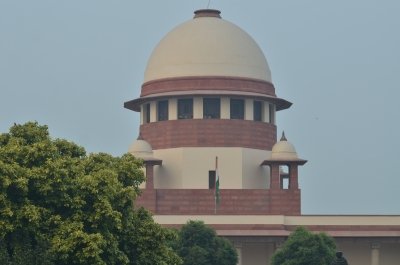
New Delhi, Aug 7 (IANS) The Supreme Court has reiterated that allowances forming part of a victim’s salary cannot be excluded while computing compensation in motor accident cases, as it enhanced the compensation to the deceased’s family from Rs 7.23 lakh to Rs 14.29 lakh.
A bench of Justices Sudhanshu Dhulia and Aravind Kumar delivered the verdict in a case arising from the death of Lokender Kumar, who passed away in 2009 after being hit by a car on the Sohna–Gurgaon road.
The appellants – the deceased’s widow and two minor children – challenged the Punjab and Haryana High Court’s award, which had upheld the exclusion of House Rent Allowance (HRA) and other benefits from the deceased’s salary while computing the compensation.
In its judgment, the apex court did not concur with the Motor Vehicle Claims Tribunal’s approach of reducing the deceased’s monthly salary from Rs 6,500 to Rs 3,665 by excluding HRA and other allowances.
Referring to the National Insurance Co. Ltd. v. Indira Srivastava case, the Justice Dhulia-led Bench observed that a deceased’s income is “not only (the) pay packet the employee carries home at the end of the month but also other perks which are beneficial to the members of the entire family”.
It said that the Supreme Court has “consistently held in case of the allowances which are included in the component of salary of the deceased, the Tribunal has to take into consideration these allowances as they were used for supporting the family” and “claimants have to show that these allowances were regularly received and used for the family’s benefit”.
Holding that no contrary evidence was produced to dispute the inclusion of allowances – which comprised about 50 per cent of the deceased’s salary – for determining actual income, the Justice Dhulia-led Bench observed that the deceased was earning Rs 6,500 per month at the time of the accident, and that amount ought to have been taken into account for computation of compensation.
After a detailed analysis, the apex court computed loss of dependency at Rs 12.48 lakh, based on a monthly income of Rs 6,500, deduction of one-third for personal expenses, addition of 50 per cent for future prospects, and a multiplier of 16.
It further granted additional amounts under other heads: Rs 48,400 for spousal consortium to the widow, Rs 48,400 each for parental consortium to the two children, and Rs 18,150 each for loss of estate and funeral expenses, bringing the total to Rs 14,29,500.
The Supreme Court ordered the insurer to deposit the sum with 7 per cent annual interest from the date of filing of the claim petition, excluding the 1,855-day delay in filing the appeal and the 75-day delay in refiling.
“The compensation awarded to Claimant No. 1 (the widow), along with proportionate interest, shall be released in her favour by the jurisdictional Tribunal. The compensation awarded to Claimant Nos. 2 and 3 (the two children of the deceased), along with proportionate and accrued interest, shall be kept in fixed deposits (FDs) in any nationalised bank,” the apex court ordered, clarifying that the periodical interest from the said FDs shall be utilised for the benefit of the two children.
–IANS
pds/vd






